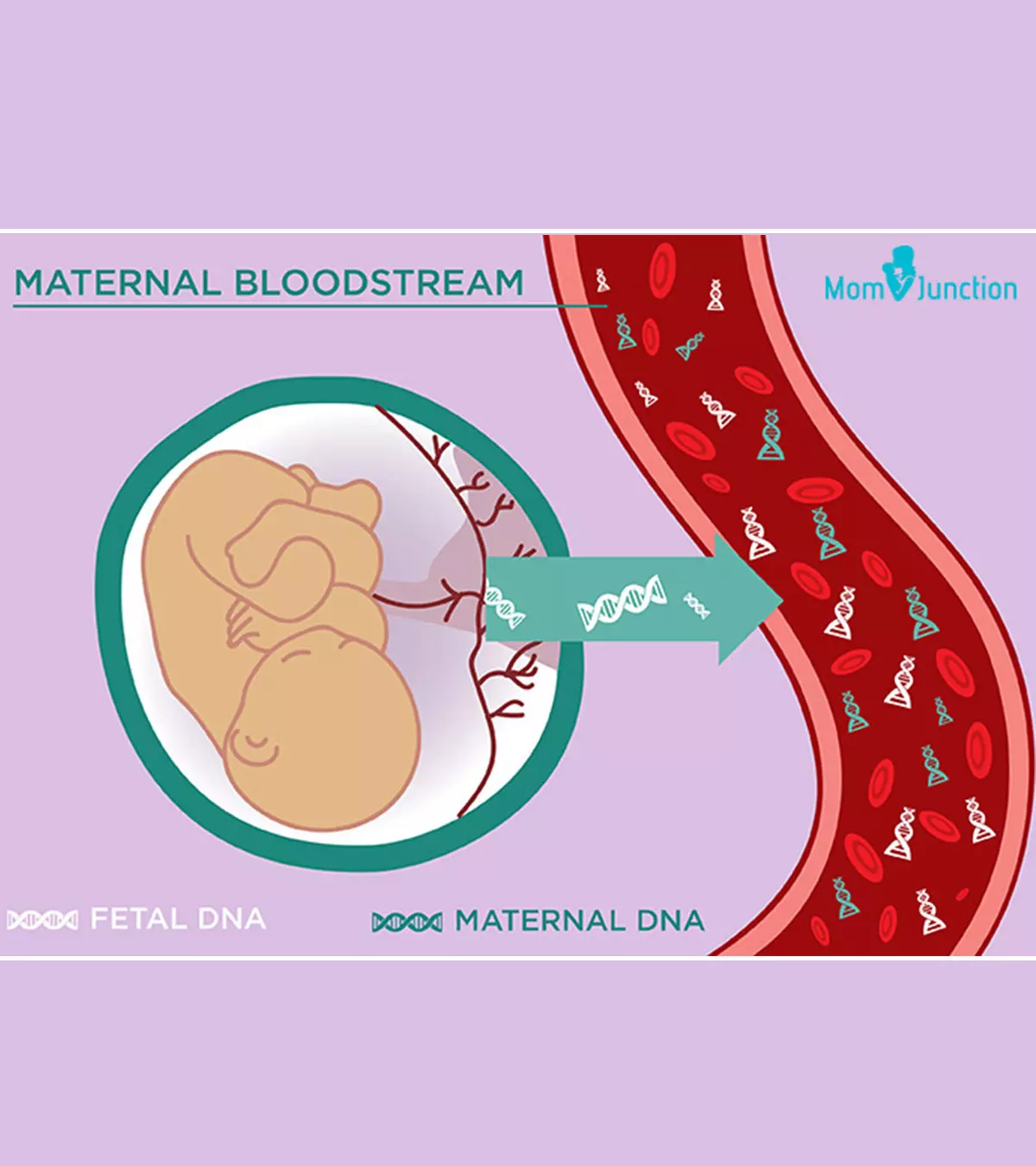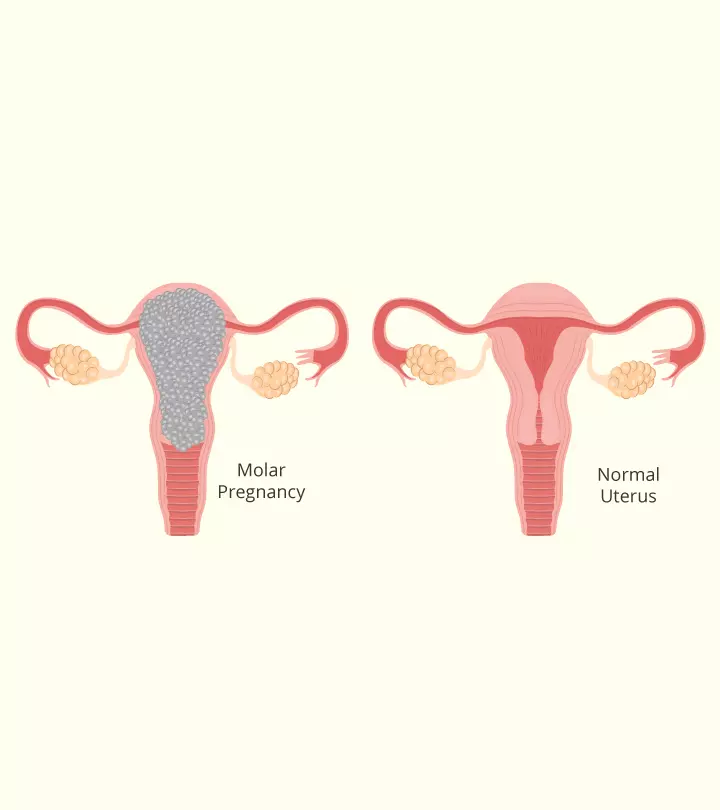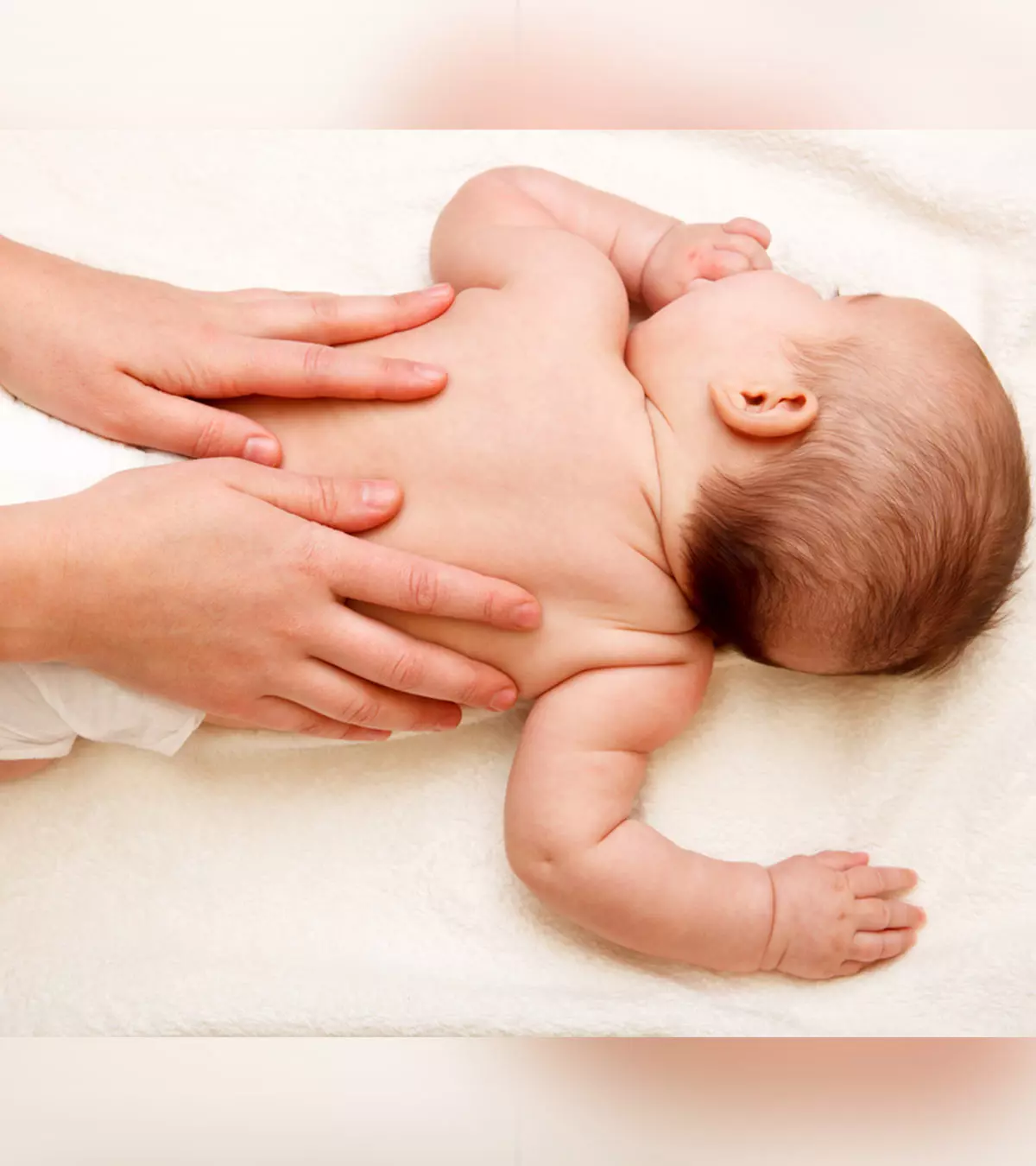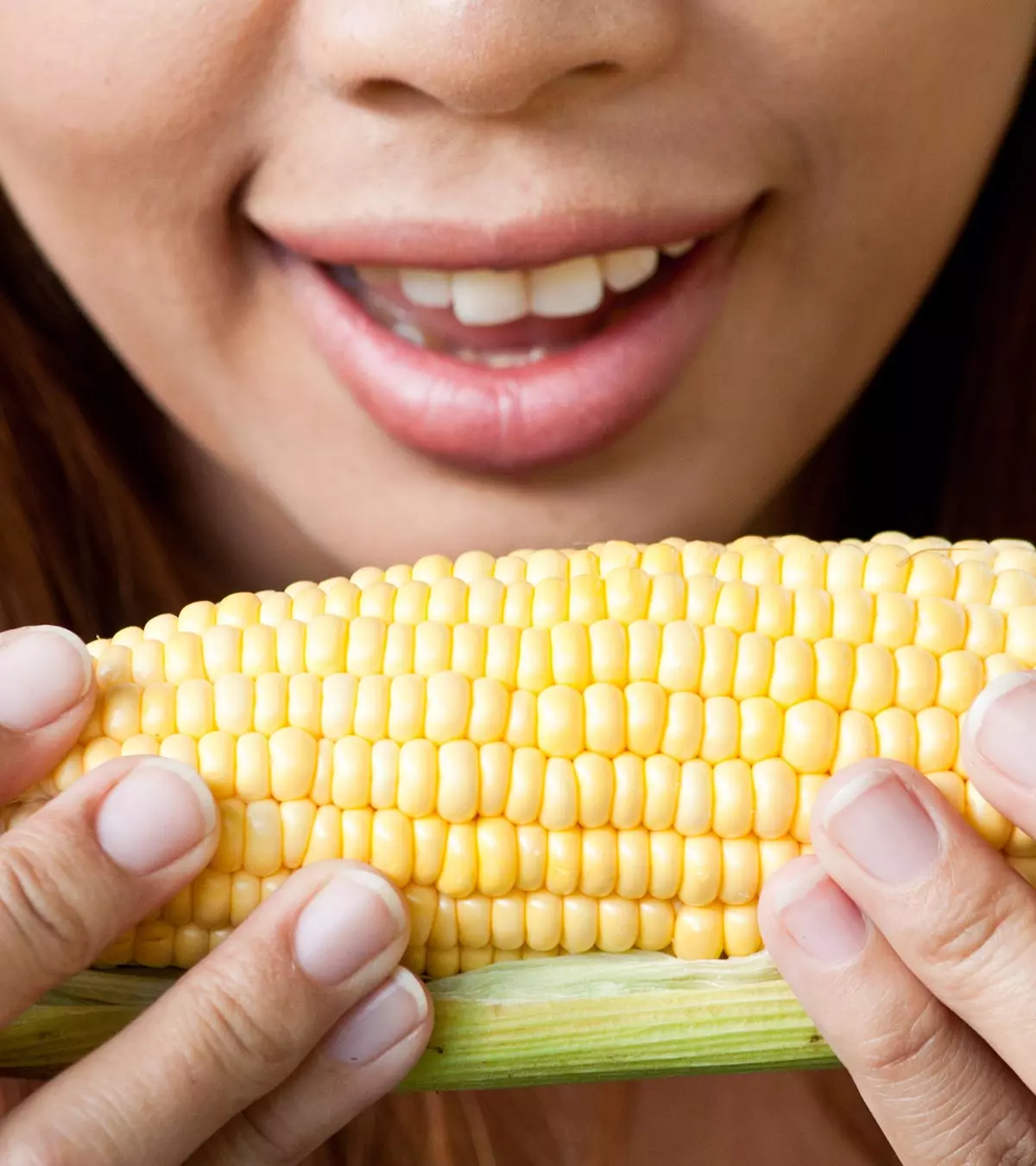
Image: Shutterstock
Corn, also known as maize, is a well-known whole grain extensively consumed worldwide. Yet, is it safe to eat corn during pregnancy and give in to your crunchy corn craving? The cereal is a good source of fiber, vitamins, antioxidants, and minerals, but all forms of corn may not be good for pregnant women. Read this post that discusses the value corn adds to your prenatal diet, possible risks, storage tips, and recipes.

Key Pointers
- Corn is a safe and nutritious food for pregnant women in moderation, as it contains fiber, vitamins, and minerals.
- Consuming corn during pregnancy can provide immune support, aid digestion, and supply essential prenatal nutrients like folate, thiamine, and beta-carotene.
- However, pregnant women should avoid high fructose corn syrup as it may cause fetal development limitations and placental abnormalities.
- When buying fresh corn, it is important to look for green-colored husks and purchase corn that is soft, yet firm.
Can You Eat Corn During Pregnancy?
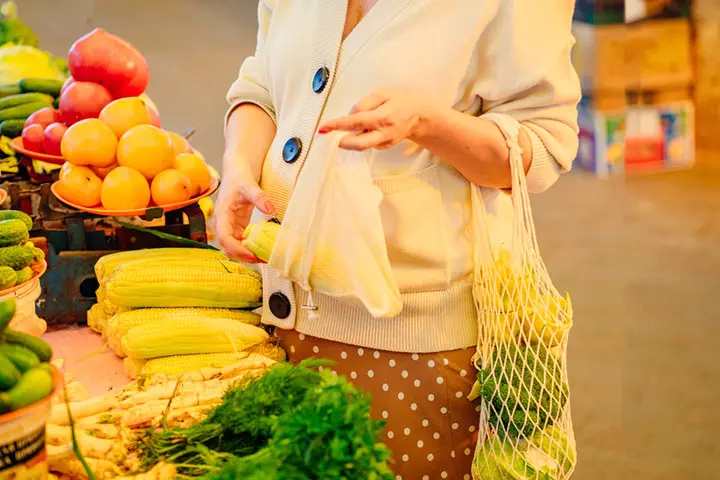
You may eat corn during pregnancy but in moderate amounts, as it helps improve digestion, and supports immunity. But excessive consumption might lead to gastrointestinal symptoms such as indigestion.
Nutritional Value Of Corn
The nutrient density in 100g of raw corn are as follows (1):
| Nutrient | RDA (2)(3) | Per 100g of corn |
|---|---|---|
| Total folate | 600µg | 46µg |
| Dietary fiber | 28g | 2.7g |
| Protein | 60g (3) | 3.22g |
| Carbohydrate | 175g | 19.02mg |
| Thiamine (vitamin B1) | 1.4mg | 0.2mg |
What Are The Health Benefits Of Corn During Pregnancy?
Corn is a highly nutritious food that comes in various colors—from white and golden to blue and purple. Here are some reasons why including corn in your prenatal diet can be beneficial:
1. Constipation
Corn is one of the best fiber-rich foods that might help foster digestive health and eradicate related problems, such as constipation, that you may experience during early pregnancy (4).
2. Macular degeneration
Corn contains a carotenoid substance called zeaxanthin that has oxidative properties. Zeaxanthin may help prevent macular degenerationiA progressive eye disease that affects central vision and can lead to blindness. of the eye (3) (5). However, further studies are needed to establish the carotenoids’iPowerful antioxidants found in fruits and vegetables that can protect against diseases and improve the overall health. role in preventing certain disorders that affect infants (6).
3. Congenital abnormalities
Corn has folic acid that is necessary during pregnancy to reduce the risk of spina bifidaiA congenital disorder where the spinal cord doesn't fully develop, leading to physical and neurological complications. and other neural tube defects in the baby(7).
4. Muscle and nervous system
Corn contains thiamine which plays a role in energy metabolism and is essential for muscle and nervous system functioning (8) (9).
 Did You Know?
Did You Know?5. Immunity
The beta-carotene in corn provides vitamin A required for immune system functioning and baby’s development and healthy growth (10).
6. Anemia
Some studies show that consuming corn during the first trimester can improve hemoglobin. This can help reduce the risk of anemia during pregnancy and reduce related symptoms like nausea, vomiting, and fatigue (21).
7. Heart health
Corn is naturally high in ubiquinone, anthocyanins, and phytosterols, which can help reduce the risk of heart disease. Apart from these, the antioxidants in blue and purple corn may reduce cancer risk. However, research for this is still underway (22).
8. Blood sugar
Although it is naturally high in sugars, corn contains complex carbs and fiber, which can slow down digestion, maintaining a steady release of sugar in the body. Furthermore, the polyunsaturated fats in corn, specifically corn oil, may help sustain energy release and keep you active all day (22).
Possible Side Effects Of Overeating Corn When Pregnant
Corn is safe during pregnancy, but experts caution against consuming corn silk as it may harm the fetus. They also recommend consuming corn in moderation, as its excess could lead to certain side effects.
- According to one small group study in mice, intake of polyunsaturated fatty acids such as corn could alter the behavior and activity of the baby (11).
- Exposure to increased quantities of fumonisin, a toxin found in some corn crops, has been linked to an increased risk for neural tube defects (12).
- It may cause indigestion; therefore, it is better to have fresh corn in limited amounts. Wendy Lord, a registered dietitian and health and nutrition writer from Gauteng, South Africa, says, “Eating corn in excess can cause indigestion and other digestive problems. Overconsumption of corn also increases the risk of heart illness because it is a rich source of fatty acids. It can also result in unnecessary weight gain that can be problematic for women during or after the delivery.”

From fresh raw corn to cooked and baked and popped, corn is available in a variety of edible forms. But are all of them good for you to eat during pregnancy?
Corn Products To Eat And Those To Avoid
Not all corn products may be safe during pregnancy. The following list can help you get an idea of what could be taken and avoided. However, it is not exhaustive.
| Eat | Avoid |
|---|---|
| Fresh corn from the cob (gluten-free) | Microwavable popcorn (contain toxic chemicals, diacetyl, and perfluorooctanoic acid) |
| Labeled GMO-free corn | Corn syrup (contains high-fructose sugars) |
| Organic corn (rich in nutrients) | Cornstarch (non-food substance) |
| Plain popcorn (butter, salt, and caramel-free) | Corn oil (full of fat and calories) |
| Frozen corn (contains fewer calories and less sodium) | Canned corn (goes through a lot of processing) |
 Research finds
Research findsSo, how can you enjoy the allowed forms of corn in pregnancy?
Ways To Consume Corn During Pregnancy
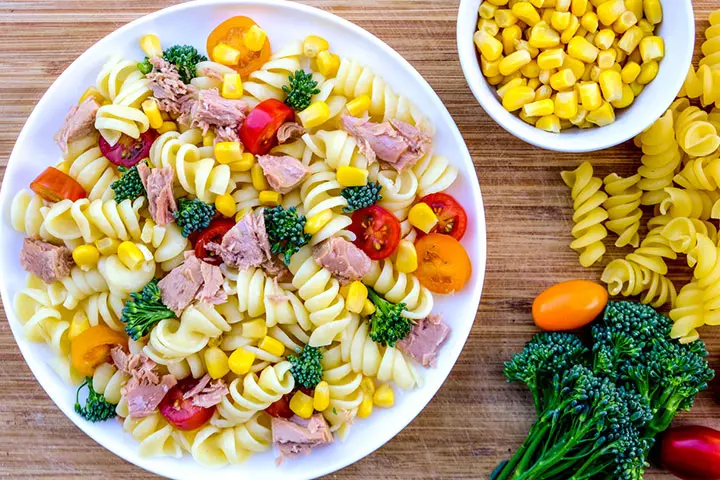
You may have a boiled corn cob as a snack. Alternatively, you can add corn kernels to other foods.
- Sweet corn is a delicious addition to salads, soups, toast, and sandwiches. Combine roasted sweet corn with avocados, cherry tomatoes, and olive oil to make a filling breakfast salad.
- Add corn kernels to pizzas, pasta, and other dishes to enhance their taste. Toss together steamed corn, cooked rice, soya sauce, vinegar, sauteed onions, garlic, salt, and pepper to make a simple yet comforting Asian-inspired rice dish.
- Grill or barbecue the cob and eat corn directly from it. Add chipotle, chili powder, and cheese or butter to the corn for added taste. Alternatively, you may combine roasted corn with black beans and make a delicious salsa to go with tortilla chips or nachos.
- Blend fresh corn with cream cheese and water. Add sautéed garlic and shallot onions and season with salt, pepper, and fresh herbs like thyme or parsley to make a rich, comforting soup.
Choose the right variety of corn to enjoy the taste of these dishes.
Tips For Buying and Storing Corn
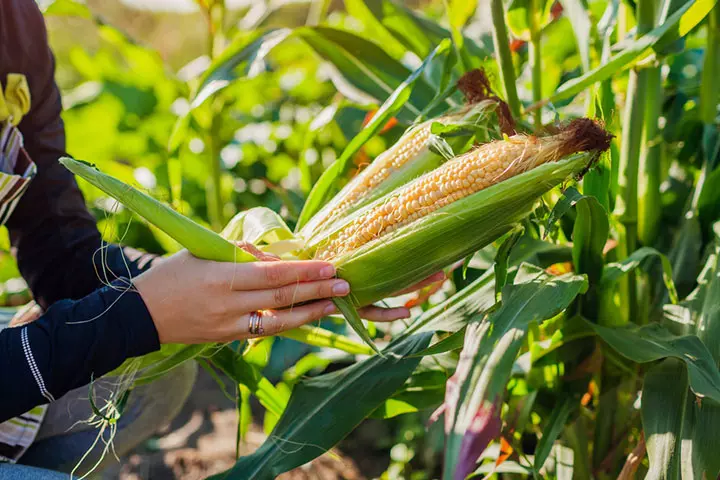
Follow the below tips while buying corn:
- Look for husks that are green in color.
- Choose only fresh corn. You may check the freshness by pulling off the husk and piercing the kernel with a fingernail.
- If the corn kennel is firm but soft and releases a little juice on being punctured, it is fresh. On the other hand, if it is discolored or dented, it is not.
- Corn exposed to high temperatures can lose a bit of its sweet flavor, as the sugar gets converted to starch.
- Let the corn remain in the husk; put it in the refrigerator.
- If you have husked the corn, put it in a plastic bag, and refrigerate it.
- If you want to eat fresh corn, eat it as soon as you bring it home.
Fresh corn has a certain appeal that might compel you to have more than what you should. And that can be a bad thing.
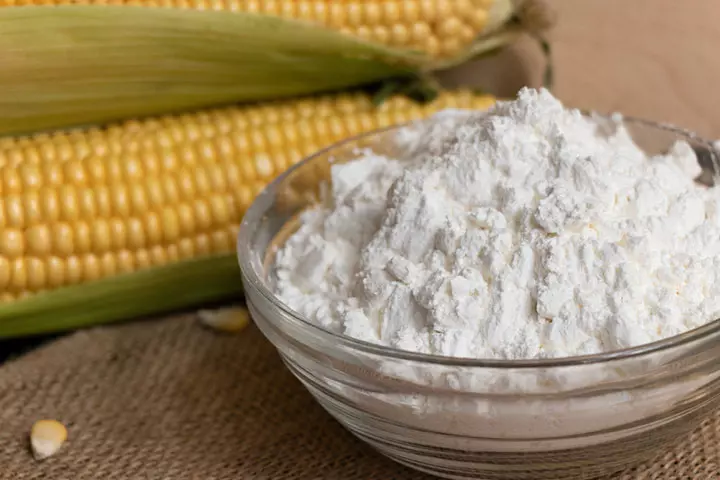
Sometimes, you may crave for cornstarch during pregnancy. This might be because of a condition called the Pica Syndrome, which involves the craving of non-food substances such as clay, ice, dirt, and more (13). If you experience such symptoms, talk to your doctor.
Lord opines, “Cravings are normal in pregnancy; however, in some cases, craving corn means a woman is deficient in nutrients such as iron and vitamin A. Corn cravings can also occur during pregnancy as a result of hormonal imbalance.”
Why Is Microwave Popcorn Not Safe During Pregnancy?
You may want to avoid microwave popcorn for these reasons (14).
- They contain a chemical called diacetyl, which is used to imitate the butter flavor. The research shows that the workers at a popcorn manufacturing factory developed a lung disorder called bronchiolitis obliterans (popcorn worker’s lung) as they inhale this chemical every day for a long period.
- A toxic chemical called perfluorooctanoic acid, which is known to be found in the microwavable popcorn bags, breaks down upon heating. It is a carcinogeniA substance or agent that is capable of causing cancer in living organisms. and likely to cause several types of cancer.
 Caution
CautionNext, we answer a few common queries about eating corn during pregnancy.
Frequently Asked Questions
1. Can I eat corn if I have gestational diabetes?
You may reduce corn consumption if you have gestational diabetes, as it is a moderate glycemic food (15). Low GI foods are likely to slowly and steadily release glucose, which might help in managing blood glucose levels (16).
2. Is overeating popcorn harmful during pregnancy?
Too much of anything is harmful. The same is the case with popcorn, as it may contain condiments such as butter, salt, or caramel. Excess of salt could lead to water retention, blood pressure fluctuations, and more, and excess of sugar could result in a host of other maternal health issues. Likewise, the excess butter might lead to fat and sodium level buildup in the body.
3. Does eating cornstarch during pregnancy cause amylophagia?
The compulsive eating of cornstarch in large quantities during pregnancy may lead to amylophagia, a form of pica disorder. The book Nutrition Through the Life Cycle by Judith E. Brown talks about its complications such as elevated blood sugar levels, preterm labor, abnormalities in baby development, and high birth weight.
4. Can corn cause weight gain during pregnancy?
Corn is rich in carbohydrates and nutrients and is a significant source of energy that may lead to weight gain during pregnancy.
5. Is eating undercooked corn on the cob dangerous for pregnant women?
It may not be dangerous to have undercooked corn on the cob. Prefer the organic variety and be careful not to have it in excess quantities.
6. What are some tips for cooking corn during pregnancy?
“The right way to cook corn is by adding it to the boiled water with some salt. The corn should be cooked for five to seven minutes and not more. Avoid overcooking the corn because it will make the kernels hard. Avoid adding too many artificial flavors and sweeteners to get the maximum benefits of corn. In pregnancy, fresh corn should be preferred over frozen and canned ones. However, you can store it in the refrigerator for a few days,” recommends Lord.
7. Is it okay to eat cornflakes during pregnancy?
Cornflakes in pregnancy are generally considered safe and can be a nutritious breakfast or snack option for expecting mothers. They are low in fat and contain high amounts of fiber, which can also help pregnant women keep their digestive system healthy and their weight in check (17).
Corn is a healthy snacking option that is loaded with fiber, vitamins, and minerals and helps the body by relieving constipation, enhancing immunity, and reducing the risk of congenital disabilities. However, you should be cautious while consuming corn during pregnancy as an excess may cause gastrointestinal issues. Moreover, all types of corn products are not good for pregnant women. You may consume fresh corn from the cob or plain popcorn, but you should avoid corn syrup or microwavable popcorn. If you feel uneasy after eating corn, check with your doctor.
Infographic: Why Have Corn During Pregnancy?
It is common to second guess most of your food choices when pregnant, as it also concerns your baby’s health. So, if you are a corn lover and are unsure about its benefits or safety during pregnancy, we suggest you give the following infographic a read. Here, we have included a few benefits of corn that you can keep a note of. Illustration: Momjunction Design Team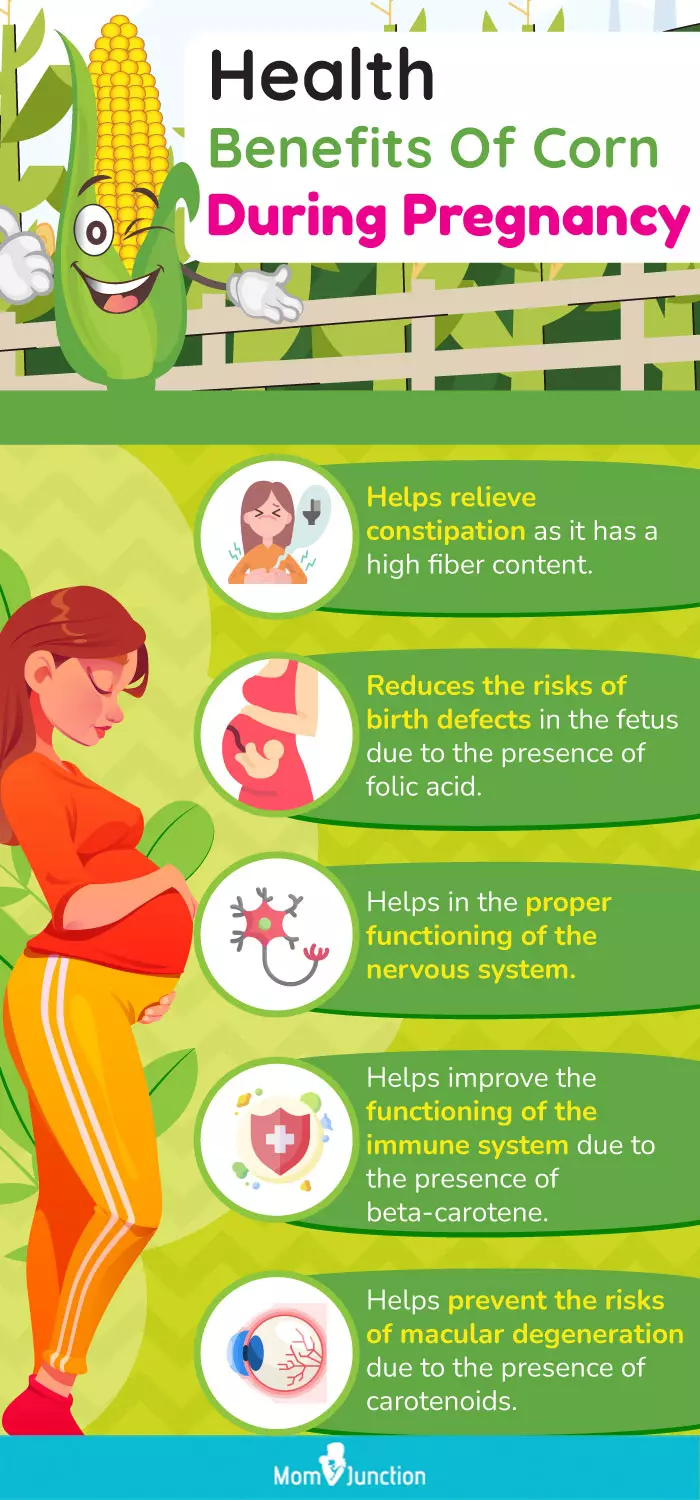
Illustration: Nutritional Benefits Of Corn During Pregnancy
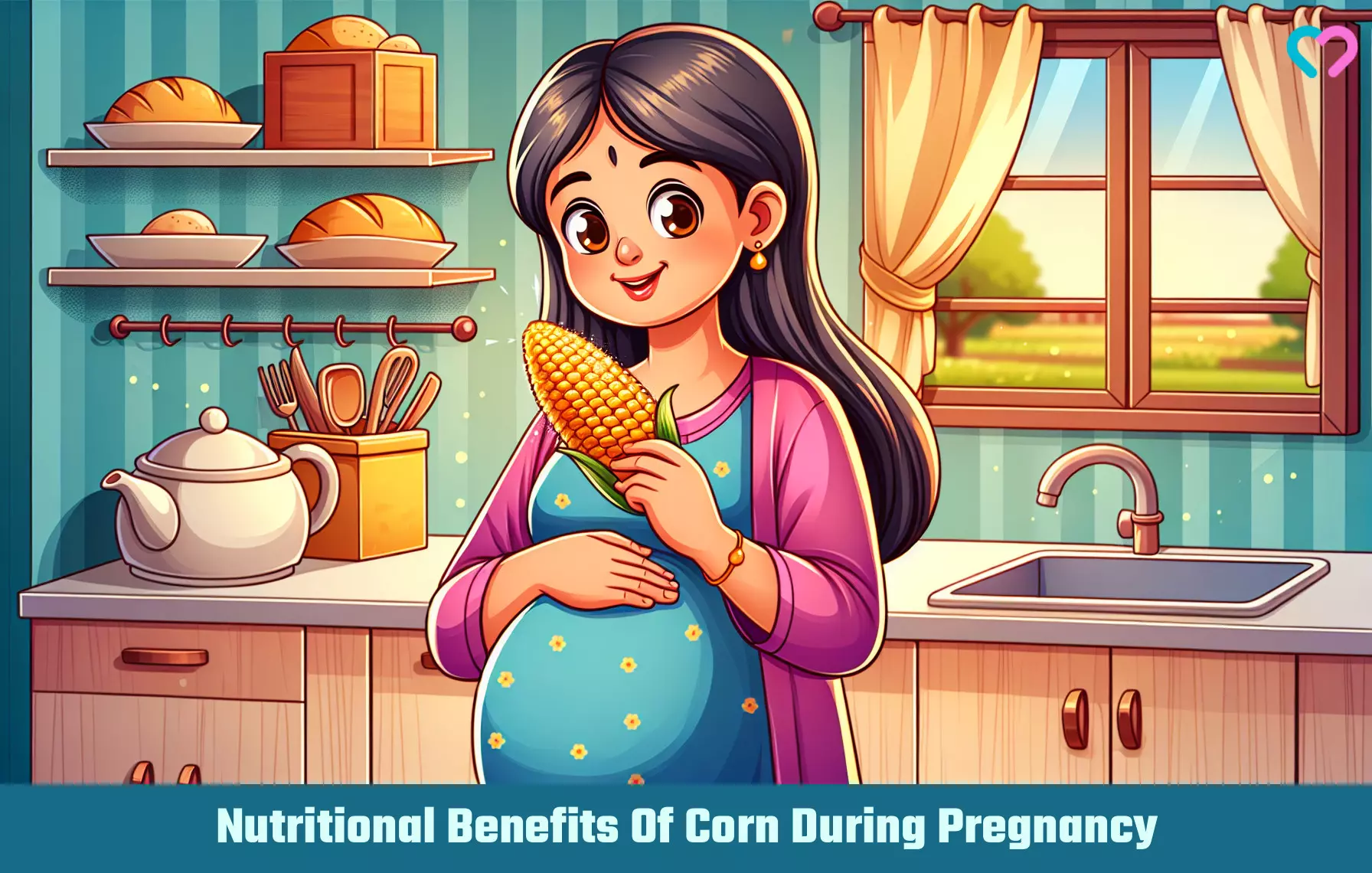
Image: Dall·E/MomJunction Design Team
References
1. Basic Report; Corn, sweet, white, raw; USDA
2. Pregnancy and Lactation; Linus Pauling Institute | Oregon State University
3. Michelle A. Kominiarek and Priya Rajan; Nutrition Recommendations in Pregnancy and Lactation; Med Clin North Am (2017)
4. Dietary Fiber; University Health Sciences Tang Center (2009)
5. Olaf Sommerburg et al.; Fruits and vegetables that are sources for lutein and zeaxanthin: the macular pigment in human eyes; British Journal of Ophthalmology, BMJ Journals
6. Monika A. Zielińska et al.; Health Effects of Carotenoids during Pregnancy and Lactation; Nutrients (2017)
7. Folate; Home & Garden Information Center; Clemson University (2005)
8. Thiamin; National Institutes Of Health (2019)
9. Sir Peter Gluckman et al.; Vitamin B1 (thiamine) in pregnancy and breastfeeding; Oxford Medicine Online (2015)
10. Carotenoids; Linus Pauling Institute | Oregon State University
11. Raygada M et al.; High maternal intake of polyunsaturated fatty acids during pregnancy in mice alters offsprings’ aggressive behavior, immobility in the swim test, locomotor activity and brain protein kinase C activity; J Nutr. (1998)
12. Gelineau-van Waes J et al.; Maternal fumonisin exposure as a risk factor for neural tube defects; Advances in Food and Nutrition Research (2009)
13. Sera Young and Jean Tiffany Cox; Pica in pregnancy; UpToDate
14. Thomas Tatem Moore.; Is Microwavable Popcorn bad for you; The Pennsylvania State University (2016)
15. TASTYRECIPES For People with Diabetes and Their Families; Centers for Disease Control and Prevention (2018)
16. Patrick J. Skerrett; Use glycemic index to help control blood sugar; Harvard Health Publishing (2012)
17. The Benefits of Eating Corn Flakes During Pregnancy; Allo Health (2025)
18. Fernando M V Dias, et al.; (2013);The connection between maternal thiamine shortcoming and offspring cognitive damage and poverty perpetuation in underprivileged communities across the world; National Center for Biotechnology Information
19. High-fructose diet during pregnancy may harm placenta, restrict fetal growth; Washington University School of Medicine
20. Can I Eat Popcorn While Pregnant?; Eat Better Move More
21. Hilda Sulistia Alam and Sutrisna Altahirah; (2025); The use of corn in trimester i pregnant women againts complaints of trimester I pregnant women at Lohia District, Muna Regency, Southeast Sulawesi in 2025; Indonesian Journal of Nursing and Midwifery.
22. 6 Health Benefits of Corn; Cleveland clinic
Community Experiences
Join the conversation and become a part of our nurturing community! Share your stories, experiences, and insights to connect with fellow parents.
Read full bio of Dr. Shikha Sharma
- Wendy Lord is a Registered Dietitian with over 20 years of experience. She did her BSc in Dietetics, and a postgraduate diploma in Dietetics And is an alumnus of the University of Natal, Pietermaritzburg.
 Wendy Lord is a Registered Dietitian with over 20 years of experience. She did her BSc in Dietetics, and a postgraduate diploma in Dietetics And is an alumnus of the University of Natal, Pietermaritzburg.
Wendy Lord is a Registered Dietitian with over 20 years of experience. She did her BSc in Dietetics, and a postgraduate diploma in Dietetics And is an alumnus of the University of Natal, Pietermaritzburg.
Read full bio of Swati Patwal
Read full bio of Rebecca Malachi
Read full bio of Aneesha Amonz






